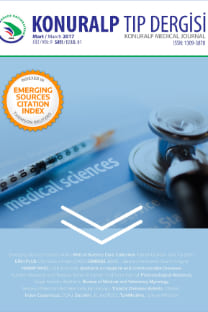Türkiye’deki Aile Hekimliği Uzmanlık Öğrencilerinin Eğitim ve Çalışma Koşulları Hakkındaki Görüşleri
Aile hekimliği, uzmanlık eğitimi, eğitim ortamı, çalışma koşulları
The Opinions of Family Medicine Residents about Education and Working Conditions in Turkey
family medicine, residency, education environment, working conditions,
___
- 1.The Board of Specialization in Medicine Curriculum Creation and Standart Setting System (TUKMOS). [Internet] [cited 2019 November 5] Available from: https://tuk.saglik.gov.tr/TR,50055/aile-hekimligi.html
- 2.World Federation of Medical Education (WFME). Postgraduate Medical Education. [Internet] WFME Global Standarts For Quality Improvement The 2015 Revision. [cited 2019 November 5]. Available from: https://wfme.org/standards/pgme/
- 3.Royal College of Physicians and Surgeons of Canada (CanMED). [Internet] [cited 2019 November 5]. Available from: http://www.royalcollege.ca/rcsite/canmeds/canmeds-framework-e
- 4.Roff S, McAleer S. What is educational climate?. Medical Teacher. 2001;23(4): 333-34
- 5.Genn JM. AMEE Medical Education Guide No. 23 (Part 2): Curriculum, environment, climate, quality and change in medical education – a unifying perspective. Medical Teacher. 2001; 23(5):445-54
- 6.Llera J, Durante E. Correlation between the educational environment and burn-out syndrome in residency programs at a university hospital. Arch Argent Pediatr. 2014; 112(1):6-11
- 7.Cebeci S, Konur M, Özdemir H, Özünal M, Sayalı E, Uzuner A et al. Opinions of family medicine residents about family medicine practice and residency education in Turkey. Working Report. 2007.
- 8.Alanyalı FM, Geroğlu B, Kurnaz MA, Can H, Öngel K. Opinions About Residency Training Program of Family Physician Residents at Training and Research Hospitals in Izmir and Their Knowledge About Family Medicine. The Journal of Turkish Family Physician .2014; 5(4): 1‐7.
- 9.Yıldırım B, Eğici MT. On‐Site Training of Family Medicine and Training Family Health Centers with the Perspective of Family Medicine Residents. Ankara Med J. 2018; 18(3): 300‐11.
- 10.Bringer A, Carroll JC. What does the feminization of family medicine mean? CMAJ. 2012; 184(15) :1752.
- 11.Weizblit N, Noble J, Baerlocher MO. The feminisation of Canadian medicine and its impact upon doctor productivity. Medical Education. 2009; 43: 442–448.
- 12.Senf JH, Campos-Outcalt D, Kutob R. Factors related to the choice of family medicine: A reassessment and literature review. J Am Board Fam Pract. 2003;16:502–512.
- 13.Naimer S, Press Y, Weissman C, Zisk-Rony RY, Weiss YG, Tandeter H. Medical students’ perceptions of a career in family medicine. Israel Journal of Health Policy Research. 2018; 7:1.
- 14.Karaoğlu N, Bulut S, Baydar A, Carelli F. State and trait anxiety among family physicians: a case control study. Turkish Journal of Family Practice. 2009; 13(3): 119-126
- 15.Oandasan IF, Archibald D, Authier L, Kathrine L, McEwen LA, Palacios M et al. Giving curriculum planners an edge: Using entrance surveys to design family medicine education. Canadian Family Physician. 2015; 61(4): e204‐10
- 16.The Council of Higher Education Residency Training Workshop Report in Medical Departments. [Internet] The Council of Higher Education. Ankara: 16 May 2017. [cited 2020 April 20]. Available from: https://www.yok.gov.tr/Documents/Yayinlar/Yayinlarimiz/tip_dallarinda_egitim_calistayi_2017.pdf
- 17.Aysan E, Köroğlu G, Türkeli V, Özgönül A, Özyaşar A, Gülümser Ç et al. Resident Physicians in Turkey: Results of a Survey of 1069 Residents from 11 Provinces. Turk J Med Sci. 2008; 38 (1): 35-42 .
- 18.Uzuner A, Topsever P, Ünlüoğlu İ, Caylan A, Dağdeviren N, Uncu Y et al. Residents’ views about family medicine specialty education in Turkey. BMC Medical Education. 2010;10: 29
- 19.Metsemakers JFM. Family medicine training in Turkey: some thoughts.Turkish Journal of Family Practice. 2012;16(1):23-34
- 20.Takahashi O, Ohde S, Jacobs JL, Tokuda Y, Omata F, Fukui T. Residents’ experience of scholarly activities is associated with higher satisfaction with residency training. J Gen Intern Med. 2009; 24(6): 716– 20.
- 21.Tan MN, Özçakar N, Kartal M. Resident Doctors’ Professional Satisfaction and Its Effect on Their Lives. Marmara Medical Journal. 2012; 25: 20-5.
- 22.Yaşan A, Eşsizoğlu A, Yalçın M, Özkan M. Job Satisfaction, Anxiety Level and Associated Factors in a Group of Residents in a University Hospital. Dicle Medical Journal. 2008; 35: 228-33.
- 23.Freeborn DK. Satisfaction, commitment and physiological well-being among HMO physicians. West J Med. 2001;174(1):13-8.
- 24.Özyurt A, Hayran O, Sur H. Predictors of burnout and job satisfaction among Turkish physicians. QJ Med. 2006;99(3):161-9.
- 25.Geneau R, Lehoux P, Pineault R, Lamarche PA. Primary care practice a la carte among GPs: using organizational diversity to increase job satisfaction. Family Practice. 2007; 24:138–44.
- 26.Le Floch B, Bastiaens H, Le reste YJ, Lingner H, Hoffman D, Czachowski S, et al. Which positive factors determine the GP satisfaction in clinical practice? A systematic literature review. BMC Family Practice. 2016; 17: 133–41.
- ISSN: 1309-3878
- Yayın Aralığı: Yılda 3 Sayı
- Başlangıç: 2009
- Yayıncı: Düzce Üniversitesi Tıp Fakültesi Aile Hekimliği AD adına Yrd.Doç.Dr.Cemil Işık Sönmez
Diyabetik Periferik Polinöropatili Hastalarda İnterlökin-23R Gen Polimofizmleri
Murat ÇETİN, Nurcan BIÇAKÇI, Sercan BIÇAKÇI, Neil J CUNNINGHAM
Monosit/ Yüksek Dansiteli Lipoprotein (MHR) ve COVID-19 Arasındaki İlişkinin Değerlendirilmesi
Belgin COŞKUN, Müge AYHAN, Elif Mukime SARICAOĞLU, Rahmet GÜNER, Esragül AKINCI, Turan BUZGAN, Bircan KAYAASLAN, Adalet AYPAK, Ayşe Yasemin TEZER TEKÇE, İmran HASANOĞLU, Ayşe KAYA KALEM, Fatma ESER, Yeşim AYBAR BİLİR, Burcu ÖZDEMİR
Tıp öğrencileri arasında ileri kafa duruşunun dağılımı ve ilişkili olduğu faktörler
Elif Kose, Huseyin Baylan, Hilal Karahan, Hasan Cetin Ekerbicer
Cep Telefonu Uygulamasının Sigara Bırakmaya Etkisi
Selcuk Mistik, Cemalinur Uzun, Inci Gulmez
Gülay YAZICI, Hülya BULUT, Burcu BAYRAK KAHRAMAN, Tunçay PALTEKİ
Nazli Celik, Bahadir Karaca, Burak Celik, Nihal Bereket, Sibel Korkmaz
Tıp Fakültesi Öğrencilerinin Yaşam Boyu Öğrenme Eğilimleri
Cansu Yilmaz, Murat Acat, Serkan Oner, Habibe Inci, Didem Adahan
